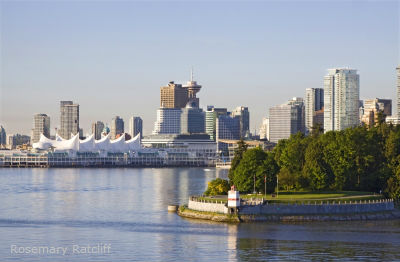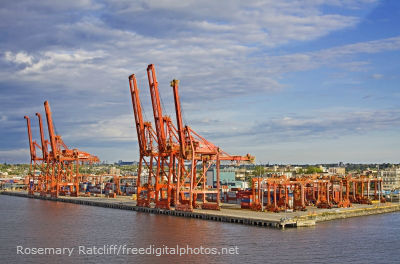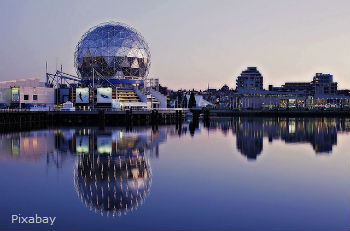This British Columbia port city is  considered one of the most livable places in the world, with high rising residential buildings standing out among a beautifully preserved natural backdrop. Located right next to Washington State in the U.S., Vancouver is an an important commercial hub. Vancouver is Canada’s eighth most populous city, and ranks among the best in the world in pollution and sustainability. Its city planning was specifically designed to combat urban sprawl by minimizing roads, utilizing vertical space with high-rises, and multi-purpose buildings. Perhaps because of this strategy, it is also Canada’s most densely populated municipality. Climate
Vancouver’s climate is best described as wet and cool. Using the Köppen climate classification system, the city's climate is considered "Oceanic" or "Marine West Coast," meaning it rains or snows throughout the year and summers and winters are mild.
Due to its coastal location and densely constructed urban area, Vancouver has some of the warmest winters in Canada. Its average daily temperature in the winter months is roughly 4.5 degrees Celsius, considerably above the Canadian average. As a result, there is not much snow accumulation in Vancouver.
Conversely, Vancouver also has some of Canada’s coolest summers. The Oceanic climate keeps the city cooler than inland cities at similar elevations. The high in the summer rarely exceeds 22 degrees Celsius while the overall average temperature in the summer months is just 17 degrees.
Also one of Canada’s wettest cities, Vancouver receives about 1,300 mm of rain a year. Summer is dryer than other seasons--rain only falls one in every five days in warm months, as opposed to half of the days the rest of the year.
Neighbourhoods
Vancouver has 23 official neighbourhoods, which house its 603,000 residents. There are a large variety of cultures that make up the many different neighbourhoods--half of the city does not speak English as a first language. Over 51 percent of the population also belongs to a visible minority group.
The large number of ethnic groups, combined with the city’s condensed space, leads to tight-knit, but isolated, neighbourhoods. Language and finances are often major barriers between adjacent quarters. Ethnic communities include Chinatown, Greektown, Punjab Market, and Little Italy.
Like most cities, there are good and bad parts of town, but crime is relatively high in Vancouver--it has the seventh highest crime rate in Canada. Vancouver ranks among the worst cities in North America for property crime, which is most likely because of homes' close proximity.
On a more optimistic note, the crime rates have fallen in recent years.
Registering Your Car
As per British Columbia regulations, you have 30 days to register your vehicle and 90 days to switch your license after moving to Vancouver from outside of B.C. If you wish to use your current valid license during that period, it is recommended that it is in English. If it is not, you can request a translation from an ICBC approved translator. This translation is not only helpful if you get pulled over during your 90 day period, but it is also required to get a new B.C. license. To get a British Columbia license, you need the required ID, your current license, a small fee, and proof that you have at least two years’ experience driving with an unrestricted license.
To get your car registered in B.C. you'll need ID, a VIN number, a fee, the title, a passed inspection report from a B.C. inspection station, and your previous registration.
If you are moving to Vancouver, or anywhere in British Columbia, from a “reciprocal country” where you have driving experience, you can usually get your B.C. license right away. Here is a list of B.C.’s reciprocal counties:
- Austria
- Australia
- France
- Germany
- Guernsey, Isle of Man
- Japan
- Netherlands
- New Zealand
- South Korea
- Switzerland
- United Kingdom
- United States
For more information, visit ICBC.com’s page on registering vehicles in British Columbia.  Employment Employment
Vancouver is one of Canada’s biggest industrial centres because of its coastal location and the fact that it is the terminus for transcontinental highways and rail routes. Port Metro Vancouver is Canada’s largest and is essential for western commerce--it generates $20.3 billion in economic output. There are certainly a lot of people employed in transportation and commerce in Vancouver.
Vancouver also employs people in many other sectors. The tourism, mining, and forestry industries take advantage of the natural resources around Vancouver, and more modern businesses have also grown to prominence in recent years. These include:
- Biotechnology
- Software development
- Video game development
- Animation
- Television
- Film
- Aerospace
Costs of Living in Vancouver
Unfortunately, Vancouver residents pay for all the city's advantages. The city has the most unaffordable housing in all of Canada, and is ranked the second worst in the entire world, according to a 2012 international housing survey. In 2010, the average Vancouver home sold for $987,500, which is almost three times the Canadian average. As a result, Vancouver also suffers from a high rate of homelessness. The average income for a Vancouver resident is just under $44,000.
Vancouver’s other living costs, such as public transportation and food, are comparable to similar cities and not especially expensive. The housing market is where Vancouverites really suffer.
Vancouver Schools

The Vancouver School Board enrolls over 110,000 students in their public school system. This includes roughly 90 elementary schools and annexes, 18 secondary schools, and seven adult education centres. The Conseil scolaire francophone de la Colombie-Britannique is the French public school district which administers to three francophone schools in the city. Forty-six private schools also receive partial funding from the province and teach 10 percent of Vancouver’s students.
There are also a wide variety of universities and other post-secondary schools in and around Vancouver. There are five public universities, the biggest being the University of British Columbia and Simon Fraser University. Both schools are well respected and receive high rankings in both Canadian and worldwide surveys. UBC is actually among the top 40 best schools in the world.
Vancouver is also home to many technical schools and colleges, such as Vancouver Community College and the British Columbia Institute of Technology, which is located just outside the city proper. Vancouver Film School has one year programs in film and video game development.
Transportation
Vancouver has many transportation options, but driving a car in the city may be the worst. Because city planners wanted to limit highways, there is just one in Vancouver. As a result, the city has the worst traffic in all of North America, stealing the notorious distinction from Los Angeles in 2013. Due to these awful driving conditions, Vancouver is the only city in Canada trending downward in per capita rate of car ownership, as well as the distance the average commuter travels to work.
Luckily, the city offers a variety of public transportation options. Since the late nineteenth century, Vancouver has been using streetcars. They have ditched the rails and toned back their use in the time since, but Vancouver still uses the second most trolleybuses in North America, behind only San Francisco. TransLink is the company that runs all of Vancouver’s public transportation. It provides B-Line express bus service, SeaBus, a foot and passenger ferry, and train services Sky Train and West Coast Express.
Vancouver has a city-spanning network of bike lanes, which has led to biking becoming the fastest growing mode of transportation in Vancouver.
Culture and Contemporary Life
Tourism is Vancouver’s second largest industry behind forestry. It is simply rare to see natural beauty adjacent to a thriving urban centre, and there is an abundance of natural sightseeing tours. The city's placement on the shore also allows beachgoers to experience the Pacific Ocean. Stanley Park is the largest (404 hectares) of the numerous parks in and around the city.
 Vancouver’s progressive ideals shine through all aspects of its culture--the city is the home to several theater companies, museums, an alternative rock scene, a vibrant nightlife, and a healthy LGBT community. The Arts Club Theater Company and Bard on the Beach are two of Vancouver’s most well-known theater troupes. The Vancouver Art Gallery in Downtown Vancouver has a permanent collection of 10,000 items, although they are rarely exhibited. If you want a museum with more access and variety, the Contemporary Art Gallery of Vancouver is a good option. In the Kitsilano district, there is a maritime Museum, a space centre, and Canada’s largest civic museum, the Vancouver Museum.
Nightlife is bustling in Vancouver, especially in the Granville Entertainment District, which has a high concentration of bars. Gastown is similar but has more upscale dining options. Davie Village is home to a thriving LGBT community.
Vancouver Moving Resources
Ready to move to or within Vancouver? Use these links to get free quotes from moving companies that serve the city. Always get multiple quotes from different companies to find the best price.
Vancouver Relocation tips
- Budget wisely. Rent is notoriously high in Vancouver and many residents are in debt due to the high cost of housing.
- Avoid driving a vehicle at all costs. Vancouver has the worst traffic in the continent.
- Riding a bike is a good alternative to paying for public transportation.
- Don’t call it “the Couve.” Although this is a real nickname, it is almost universally met with eye-rolls from locals and outsiders alike.
- Try to find work within walking or biking distance of your home.
- You will likely live in a high rise, so give yourself enough time to get all the way down your building when commuting.
- Be very modest when selecting a home in Vancouver to avoid sticker shock and housing debt.
Helpful Links
|